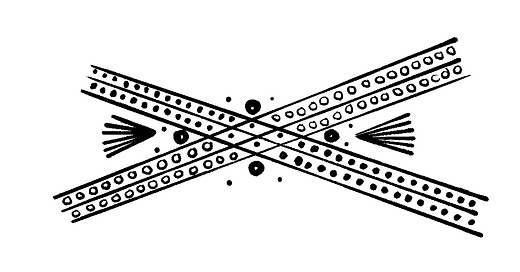Contentment is a Technology
Contentment is a technology. It's a technology of Having, one of the four phases of the cycle of manifestation.
The cycle of manifestation is not about the law of attraction, it is about my relationship to that which I cultivate in my life as it becomes real. It is not mystical or magical. When it comes to anything in my life, real, not real, or not-yet real, I am in a relationship to it of wanting it, receiving it, having it, or releasing it.
Consumer culture loves us wanting and receiving, and would love to have having all the way out of the equation.
Technologies of Having are contentment, repair, maintenance, satisfaction, responsibility, appreciation. When I list them, it's clear how little value our culture places on these particular technologies. Look to the next thing, buy a new one, buy something that doesn't require maintenance, never settle, get away from responsibility, strive for better.
Consumer culture wants us ignorant of the technology of Having because it keeps us hungry to buy more things.
Everything we have been taught about hustle and productivity and achievement has coached us out of Having, out of the technology of contentment in particular.
The technology of contentment is the intimacy of enjoying and being in love with exactly what is.
My contentment is such that I take the same walk every day, eat similar foods, see the same people, and crave for NOTHING at all. I seriously for the first time in my life cannot connect with the sense of seeking any added relational novelty. I don't want to travel, I don't hope to meet someone, I don't want to buy anything, or move, or drive a different car. Novelty is sure to find me, and I am sure to enjoy it, but the seeking of it is gone.
So many of us spend our lives feeling the sense that something is missing. The bitch of this is, it's often true. We were designed and entrained across millennia to have vibrant social lives with people who know us well, hours of sunshine every day, and consistent physical movement. If an alien race looked at all of human history and then designed us a zoo, that captivity would likely be far more humane than the lives many westerners live today.
It takes very little, conditionally, to be content, but what it takes has been engineered to be rare in our culture. This means that it can be true that the conditions of our lives flout our contentment—yet also true that the arrival of those conditions will not provide contentment.
Contentment is a relational technology, in that it is mostly about how I am in relationship to the here and now, and a little bit about what that here and now looks like.
Without the technology of contentment, I could be in the best possible circumstances, as defined by me, and still feel dissatisfied, still have complaints.
In a habit of striving, I use the ideal conditions as a place from which to yearn and strive more.
The ideal conditions are ideal for dreaming up improvements and demands of reality.
Arriving is the beginning of trying to get somewhere else.
Contentment requires that I dream up the ideal circumstances, allow them to manifest, and prepare to let them be enough. I prepare to milk the enjoyment, focus on my presence, appreciate what IS, maintain it, tune it, hold a tone. I prepare to release resentment and burden at their earliest signs. I prepare to grieve the loss of hope for something "better" when I know I am welcoming in the best. Hope is a real thing, and losing it is a real loss, even if it is making way for me to HAVE what I hoped.
Contentment is a crucial technology to have a happy family, one modern dating practices do not cultivate. Modern dating practices are all wanting-receiving-releasing, and that's why there are so many meet-cutes and breakups and so few ongoing happy families.
It is BORING, banal, mundane, ordinary. Contentment is not outwardly exciting or flashy. What's outwardly exciting and flashy is exhausting and unfulfilling. It's trying to get contentment while reviling all contentment's components. It's a trying-to-get that can only lead to more trying-to-get.
What, conditionally, would it really take for you to feel contentment day in and day out?
This question will reveal both the gaps in your conditions as well as the gaps in your relational contentment.





